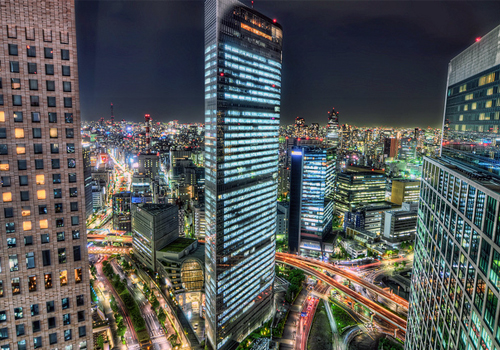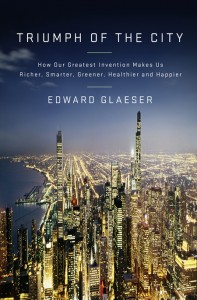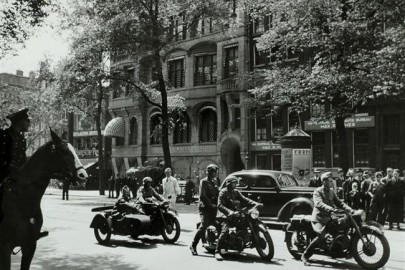Elberry reads “a well-informed, intelligent, and judicious book” but instinctively disagrees with its author…
My stepfather once said: “I hate cities. I don’t much like towns, either.” He’s lived most of his life in a village in West Yorkshire, and worked as a bus driver for a good twenty years. He was a popular driver and knew many of his regulars by name and memorable eccentricity. He educated the semi-feral schoolchildren to say “thank you”, by the simple expedient of thanking them until they started to mumblingly reciprocate. He doesn’t read, doesn’t really like television, has almost no interest in buying anything.
Edward Glaeser would dismiss him as an ignorant, destructive yokel. For Glaeser, anyone who doesn’t live in a city is either a carbon-emitting fool or a mud-encrusted peasant with rickets. I instinctively disagree. That out of the way, this is, on the whole, a well-informed, intelligent, and judicious book. If one disagrees, it isn’t so much because of Glaeser’s facts and arguments, as his whole perspective; he is as much a city-man as my stepfather is not. So Glaeser:
Rousseau famously wrote, ‘Cities are the abyss of the human species,’ but he had things completely backward. Cities enable the collaboration that makes humanity shine most brightly. Because humans learn so much from other humans, we learn more when there are more people around us. Urban density creates a constant flow of new information that comes from observing others’ successes and failures. In a big city, people can choose peers who share their interests, just as Monet and Cézanne found each other in nineteenth-century Paris, or Belushi and Ackroyd found each other in twentieth-century Chicago. Cities make it easier to watch and listen and learn. Because the essential characteristic of humanity is our ability to learn from each other, cities make us more human.
This is one mode of human creativity, feasting on social interaction, on a public life. There is another, which requires isolation, freedom from the judgement of others (and one man may require both). It depends on what exactly you’re trying to do, and who you are. For any enterprise in need of a large public, cities are obviously the thing; so, of theatre:
Any five-year-old can put on a play, but a modern West End experience includes a large stage, sophisticated lighting and sound equipment, and often ornate interior spaces. The fixed costs of plays also involve the time required for actors to learn their lines and perfect their roles, something most five-year-old performers skip. Drama is affordable to ordinary people, as the Old Vic was to its poorer audiences in Lambeth, because those fixed costs are spread across thousands of viewers.
True, but on the other hand when Glaeser asks:
Would Thoreau have been able to write so well about living alone if he hadn’t also connected with so many smart people in towns?
I feel he is missing something, that he cannot understand writing apart from the salon, full of smart, well-dressed, giggling, public men and women. His perspective is materialist, progressive, utilitarian. He dismisses beauty as nice for tourists but, well, not really useful. He marshals reams of data about carbon emissions, happiness surveys, economic productivity, crime, traffic, to demonstrate that we should all live in cities. Most of it means nothing to me, since I know plenty of people who earn large sums of money, and would probably say they are happy (because they have money) who are permanently stressed, anxious – unhappy, in fact. They may, in Glaeser’s terms, be “more human” than a man like my stepfather, but then I would take issue with Glaeser and his terms.
Glaeser may be a city man but he is not stupid; he recognises that many cities are, in fact, pretty horrible. He is very good on the apparent causes of urban blight, on traffic, crime, and the spectacle of cities like Detroit. If cities are one form of the urge to organisation, this order is not easily maintained:
Contagious diseases turn the great urban advantage – connecting people – into a cause of death. Traffic congestion eliminates that advantage altogether by making it too hard to get around in a city. Too much trash turns city streets into a health hazard; too many drivers turn city streets into a parking lot. Providing clean water requires an engineering solution, but providing uncongested streets requires more than just technical know-how. Our streets only become usable when people don’t overuse them, and that calls for the tools of an economist. Driving creates a negative externality, because each driver typically considers only his own private costs and benefits.
There is something mesmerising and improbable about cities. Most of the time, people usually only consider their own “private costs and benefits”. A city – an assemblage of hundreds of thousands of human beings – should be a chaos of brigandage and murder, but it can work. Glaeser is particularly good on the reasons cities don’t work. So I learnt of the horror that is Mumbai, with its Lovecraftian traffic and overcrowding:
But Mumbai’s height restrictions meant that, in one of the most densely populated places on earth, buildings could have an average height of only one-and-a-half stories. People still came; Mumbai’s economic energy drew them even when living conditions were awful. Limiting heights didn’t stop urban growth; it just ensured that migrants had to squeeze into less space. Keeping Mumbai flat also ensures longer commutes, and that makes the congestion that comes with crowding more severe.
Glaeser is critical of building restrictions. Paris, Mumbai, New York – all highly expensive because the government blocks development. He is, however, aware that when the life deserts a city (as in Detroit), new buildings, new public works, will do no good. In general, Glaeser is opposed to universal solutions. He seems aware that a city has something like a life of its own – which comes from the lives of its inhabitants, but is not to be readily calculated or predicted. There is a pleasing quantity of good sense in the book; here he discusses two types of city, the hipsters’ paradise and the business world:
The first vision, with its fondness for coffeehouses and public sculpture, seems aimed at a twenty-eight-year-old wearing a black turtleneck and reading Proust. The second vision, with its focus on core urban services, seems to address the needs of a forty-two-year-old biotech researcher concerned about whether her family will be as comfortable in Boston as it is in Charlotte. There are roughly three times as many people in their thirties, forties, and fifties as there are in their twenties, so it would be a mistake for cities to think that they can survive as magnets for the young and hip.
To some degree, the life of a city just takes place, of its own accord. The most a government can do, it seems, is to not get in the way, or at least no more than is necessary. The life of a city is so complex that it seems hubristic to try and precisely determine its course. In the end, cities are the products of human beings and we are essentially difficult and unpredictable creatures – as an example, I think of myself as a mud-encrusted peasant but have chosen to live in one of the swankiest cities in the world, Munich. I wouldn’t go so far as to say I like it, but all the same, here I am, a part of the city.












Thanks for the review Elberry
Guess it depends on the city – some (like Munich) are just sort of very agreeable large towns, others like London, are so big as to be self contained zones with different laws and customs.
Swings and roundabouts innit – wherever one lives, you then construct the self-validation for having chosen that place over others, and defend it.
In Munich it’s all about the dirndls.
Ahh the dirndl, purveyor of ‘gaudiknockerl’